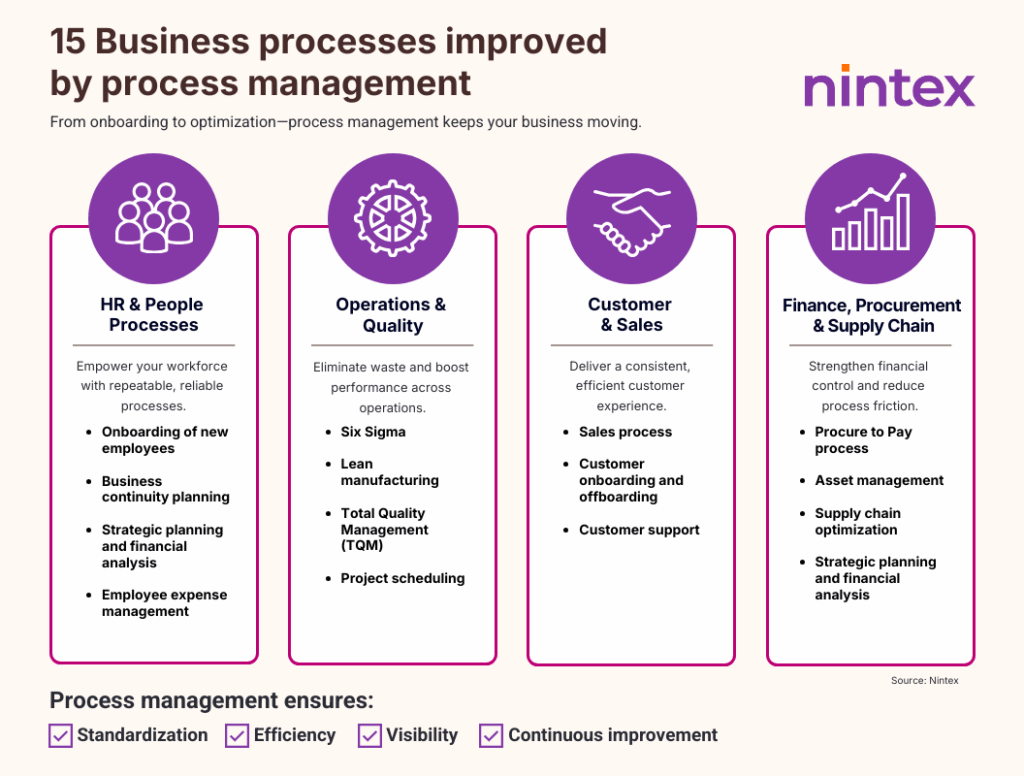Let’s explore the fundamentals of process management, the backbone of successful business operations.
Good process management helps you save time, extend resources, lower risks, and – best of all – leads to higher productivity organization-wide.
Definition of process management
Process management refers to the systematic planning, execution, and oversight of workflows to ensure tasks get done quickly and effectively. It’s a key element in any successful business’s operations. Process management involves the systematic design and implementation of activities that are performed in order to achieve a specific goal or outcome. It is a more organized way of managing how tasks are tackled within an organization. The importance of process management lies mainly in its ability to save valuable time, energy, and resources. It also helps to establish clear steps for employees to achieve specific outcomes and helps ensure that everyone is on the same page about how things are supposed to get done. It is these repeatable actions that increase efficiencies across the business.
Some examples of different processes that benefit from process management:

- Onboarding of new employees
- Business continuity planning
- Asset management
- Procure to Pay process
- Product development process
- Sales process
- Strategic planning and financial analysis
- Expense management
- Customer onboarding/offboarding
- Customer support
- Six Sigma
- Lean manufacturing
- Total Quality Management (TQM)
- Supply chain optimization
- Project scheduling
Ultimately, process management makes it easier for employee teams at any business level — large or small — to move quickly and stay organized while achieving their desired goals. Process management is proven to deliver business benefits such as cost savings, increased productivity, better quality control, and improved customer satisfaction.
Why is process management important?
Process management is more important than ever in today’s fast-moving environment and the age of digital disruption. It challenges us to think differently when it comes to how we interconnect with the world and how best to use all available resources. By following best practice guidelines, process managers can optimize activities and identify opportunities that maximize impacts while reducing risks and failure. Perhaps even more importantly, it encourages collaboration between stakeholders, allowing teams to leverage their combined expertise and knowledge.
With challenges and opportunities arising from rapid changes in technology, it is essential for organizations to stay ahead of the competition by having an effective process management system and practice in place.
In particular, organizations that need to manage organizational risk, compliance, and quality control measures can benefit greatly from a process management approach. Ensuring that every employee can access a well-defined set of procedures, so everyone has a clear understanding of what is expected of them, reduces risk and eases auditing. Proactively identifying errors quickly and easily means that problems can be rectified before they become bigger issues, allowing organizations to move forward securely and efficiently. Properly managing processes (and consequent risk), companies will save money, create efficiencies, and ease the auditing process across their business operations
What tools are available to support process management?
Process management tools are an invaluable asset in the corporate world. Often called business process management (BPM) tools, they provide an easy way to visually plan, map, and manage these sets of complex tasks, workflows, or operations. They capture what tasks need to be accomplished, who has been assigned those tasks, and when they should ideally be completed. They improve efficiency by putting more data at your fingertips, streamlining processes with pre-set templates, and ensuring all team members can easily access them to stay on the same page. Process management tools also often have built-in analytics capabilities which provides insights into the performance and progress of processes, enabling companies to understand their strengths and weaknesses and continuously recommend improvements for better use of resources.
Nintex offers the most complete process management and automation platform, including Process Manager, which will have you planning, mapping, and managing your processes much quicker than you might think.
Process management applied
Process management is a key enabler for change management in any company or organization. It’s essential to have efficient processes that are dynamic and able to adjust and scale as your business grows. Taking a step back and looking at existing processes is often necessary for efficient change management, as it allows organizations to find weak spots and optimize team dynamics, saving the company time and money. Process management also allows teams to create more reliable protocols in customer service, sales, operations, IT, engineering, and other areas where process clarity matters.
The process can be complex, but with an effective change management strategy in place, companies can easily maintain their business operations while adapting to change and its associated challenges. A good change management strategy should include a plan for dealing with change on a regular basis and ways to measure success or failure along the way. Process management will help organizations stay agile and responsive to change in today’s ever-evolving business environment.
Process Manager and business process modeling
Businesses can reap numerous advantages from making process modeling an integral part of their regular workflow. Process modeling offers a concrete way to gain a clear understanding of how your business works, as well as uncover opportunities to optimize processes and improve response time. This can be as straightforward as improving customer service or automating certain parts of the production line. Business process modeling also provides visibility over key operations and offers objective examples of how to streamline processes, so teams can work more efficiently together. Ultimately, by having the ability to think objectively about how the business works, you can create more agile and effective systems that support greater success for everyone involved.
Process Manager and performance management
Successful performance management doesn’t happen by accident, and process management is necessary for creating a performance management system that achieves results. From evaluating business objectives to developing performance indicators, process management is critical for establishing an effective performance system. By creating goals and standards that employees can easily understand and follow, companies can ensure that performance expectations are applied consistently.
Furthermore, businesses should continually assess their process performance to ensure they are efficient and up-to-date so problems arising from the system can be identified and managed quickly. With effective process management, businesses can be confident that their performance management systems will deliver real results. By implementing process management, your business can realize higher profitability and growth over time.
Process management and risk management
Process management is an invaluable tool for risk management and is a major key to success for any business, big or small. It helps to identify weak points in business operations and can give visibility into areas that may be more prone to risk.
By having a clear view of the process, risk managers can foresee issues, adjust systems and procedures, and react quickly and decisively to challenges.
Process management allows businesses to continuously improve their core processes and maintain a competitive advantage regarding risk management. When done effectively, these processes will give you peace of mind knowing that risk has been accounted for and prepared for, leaving you time to focus on growth and other important elements of running your business.
What is good process management?
Good process management is the foundation for running a successful business. It’s also the logical place to start your digital transformation journey. Until you understand your business processes, you will not know which ones should be automated.
Good process management involves a complete understanding of all processes from start to finish so that you can identify areas of opportunity for streamlining them. With good process management, leaders can understand what needs improvement in their processes so they can drive growth for more efficient outcomes. It’s not just the tangible elements though – process management helps build a successful culture by creating transparency, accountability, ownership, and increased collaboration throughout the organization. Adopting a good process management practice can ensure all teams are working toward common goals with clarity and direction, leading to smoother workflows, an improved bottom line, and happier customers.
What skills are related to process management?
Process management is an increasingly important business skill to have. It requires efficiency, problem-solving, and communication skills in order to effectively oversee a process from beginning to end. Having a strong sense of organization is essential, as well as being able to handle multiple tasks simultaneously. Process managers must also be able to adapt quickly and think on their feet when changes arise or challenges occur. In addition to these core skills, process managers must be able to anticipate potential issues before they arise and take the initiative in developing solutions. The ability to balance the technical aspects of the process with the people involved is also key; this means process managers are required to be both knowledgeable about the process itself while displaying interpersonal savvy at the same time. A successful process manager possesses all these skills combined with a strategic outlook and resourcefulness in order to get results.
With the development of process management tools like Nintex Process Manager, the role of the process manager becomes far easier, reducing the business’s reliance on these highly skilled employees. These tools have progressed so much and are so easy to use that even line-of-business employees—the ones with an intimate understanding of the individual steps in the processes—are able to map and manage processes. That’s time and talent well spent.
